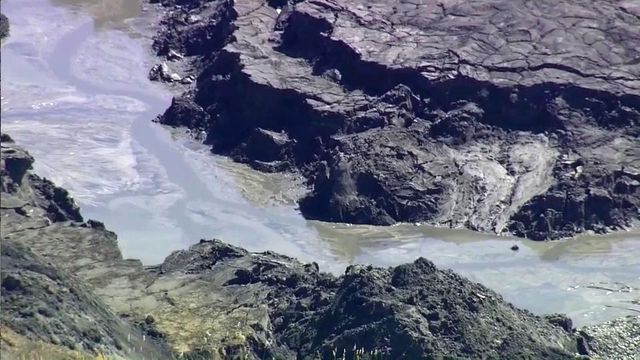McCrory vetoes coal ash bill
Gov. Pat McCrory says the General Assembly's effort to reconstitute the Coal Ash Management Commission still unconstitutionally treads on his authority.
Posted — Updated"This legislation is not good for the environment or for the rule of law in North Carolina," McCrory said in a news release Monday night.
Lawmakers were not surprised by the veto. McCrory used news releases to express his displeasure with the bill and sent his general counsel and the secretary of environment to deliver his veto threat in person to lawmakers during committee hearings on the bill. The new law was drafted to replace another, similar measure that McCrory sued over in late 2014.
"I'm disappointed," said Rep. Chuck McGrady, R-Henderson. "It just delays the process of cleaning up even more."
A veto override seems all but certain. Senate Bill 71 cleared the House on an 84-25 vote and left the Senate with broad bipartisan backing, 47-1. The House needs only 72 votes to override a veto, the Senate, 30. But should lawmakers override his veto, McCrory has said that he will go to court a second time in hopes of striking down the measure.
While the bill got mixed reviews from environmental groups, Duke Energy has supported the measure.
"We don’t understand why the Governor would veto a bill that makes North Carolina’s Coal Ash law even stronger. Very importantly, it reconstitutes a Commission that will evaluate the safety and cost of any closure plan on customers," according to a statement by Duke spokesman Jeff Brooks.
McCrory and his administration insist they have been pushing Duke to speed the cleanup, but McGrady insists the veto and threatened litigation over the law will only delay the cleanup and provision of clean water to affected communities.
"I just wished we'd get this worked out for good," Senate Rules Committee Chairman Tom Apodaca, R-Henderson, said.
McCrory argued in his news release that the bill would slow the provision of water to homeowners with wells fouled by nearby coal ash ponds.
"This bill lacks a firm deadline to connect well owners to alternate water supplies," McCrory said.
Lawmakers say their measure provides the first legal assurances that homeowners affected by nearby coal ash ponds will receive permanent water supplies.
"Rep. McGrady is misleading the public," said McCrory spokesman Josh Ellis. "It's the bill that allows the delay of the clean up and the connection to alternate water supplies."
Executive power at issue
For decades, Duke has stored the waste left over after coal is burned to generate electricity in unlined pits near the company's steam stations, all of which are perched on various lakes and waterways. While the problems posed by the material, which is laced with heavy metals and other materials harmful to human health, has long been a subject of debate with the state, the company and environmentalists, it long remained below the radar.
That changed in February 2014, when a pipe under a coal ash pit in near Eden burst and spewed tons of the material into the Dan River. In response, state lawmakers passed a bill setting timelines for cleaning up the 33 ponds across the state, depending on whether they were rated as a high, medium or low risk.
The spill focused attention on the issue, but environmental advocates argue that toxins from the pits have been seeping into local water supplies for the years.
When lawmakers returned to work in April, they began formulating a fix for the situation. The reconstituted Coal Ash Management Commission would give the governor the majority of appointments, but they would be subject to confirmation by the General Assembly, something McCrory says undercuts his ability to manage the cleanup and runs counter to the Supreme Court's ruling in the earlier case. Lawmakers say they believe they've followed the guidance laid out by the court.
Last year, the rift between McCrory and lawmakers manifested itself in overheated rhetoric.
Apodaca said the conflict was "much less of an issue" this year. "We all know where each other are and why."
Conflict will continue
Both McGrady and Apodaca said it's likely their chambers would move to override McCrory's veto quickly.
The drafters of Senate Bill 71 had baked in the potential for an ongoing conflict into the bill. In the event the commission's work is delayed by litigation, the bill hands its job over to the Environmental Management Commission, another independent group.
However, McCrory says that safety valve is also unconstitutional because it, like the Coal Ash Management Commission, reviews and approves administration actions.
"They take away executive decision-making from where the voters and our constitution have lodged it and instead place it in the hands of appointees who are neither answerable to the Governor nor accountable to the voters," Robert Stephens, McCrory's general counsel, wrote on May 24.
That appears to open the door to wider consequences from this fight between branches of government. If McCrory were to pursue that line of thought to its fullest extent, he could be asking the court to dismantle a network of boards and commissions throughout state government that oversee executive actions.
"Meanwhile, those people sitting out near coal ash pits wonder what they're going to do for water," McGrady said Monday.
McCrory's news release says his administration would push through the courts to require Duke to provide municipal or other water hookups to affected homeowners.
"The McCrory administration will ask a court to require Duke Energy to meet an accelerated timeline for connecting alternate water supplies. The administration will also seek a court order to ensure that dam repairs are completed and coal ash is reused in an environmentally-sound way," the release said.
Related Topics
• Credits
Copyright 2024 by Capitol Broadcasting Company. All rights reserved. This material may not be published, broadcast, rewritten or redistributed.






